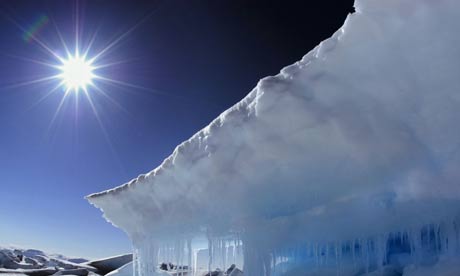Alert over scramble for control of energy resources in the Arctic

The EU report warns of increasing international tensions as global warming opens up new areas for energy exploitation. Photograph: Louise Murray/Science Photo Library
European governments have been told to plan for an era of conflict over energy resources, with global warming likely to trigger a dangerous contest between Russia and the west for the vast mineral riches of the Arctic.
A report from the EU's top two foreign policy officials to the 27 heads of government gathering in Brussels for a summit this week warns that "significant potential conflicts" are likely in the decades ahead as a result of "intensified competition over access to, and control over, energy resources".
The seven-page report, obtained by the Guardian, has been written by Javier Solana, the EU's foreign policy supremo, and Benita Ferrero-Waldner, the commissioner for external relations. It predicts that global warming will precipitate security issues for Europe, ranging from energy wars to mass migration, failed states and political radicalisation.
The report warns of greater rich-poor and north-south tension because global warming is disproportionately caused by the wealthy north and west while its impact will be most catastrophic in the poor south.
The officials single out the impact of the thawing Arctic and its emergence as a potential flashpoint of rival claims, pointing to the Kremlin's grab for the Arctic last year when President Vladimir Putin hailed as heroes a team of scientists who planted a Russian flag on the Arctic seabed.
Developments in the Arctic had "potential consequences for international stability and European security interests".
"The rapid melting of the polar ice caps, in particular the Arctic, is opening up new waterways and international trade routes," the report notes. "The increased accessibility of the enormous hydrocarbon resources in the Arctic region is changing the geostrategic dynamics of the region."
The report also stresses the volatility of the regions that hold large mineral deposits and predicts greater destabilisation in central Asia and the Middle East as a result of global warming. The report comes as the issue of energy security begins to loom large on the agenda of western policymakers. A summit of Nato leaders in Bucharest next month will discuss the problem for the first time, while a new manifesto for a radical overhaul of the western alliance moots the possibility of Nato being used "as an instrument of energy security".
"There will be a discussion of these new security risks, including energy," said a senior Nato diplomat. "We will try to find areas where Nato can add value."
The 150-page manifesto for a new Nato, penned by five former chiefs of staff and senior Nato commanders from the US, UK, Germany, France and the Netherlands, also points to the likely friction in the Arctic as a result of climate change.
The Arctic thaw has already created "minor tensions" between Russia and Nato member Norway over fishing rights around the Spitsbergen archipelago. "The islands of Spitsbergen ... have large deposits of gas and oil that are currently locked under a frozen continental shelf," the document states.
"If global warming were to allow this to become a viable source of energy, a serious conflict could emerge between Russia and Norway." This "potential crisis" would draw in the US, Canada and Denmark "competing for large and viable energy resources and precious raw materials".
With specific reference to Arctic exploration, the EU's report says: "The scramble for resources will intensify."
But the retired generals complain that the EU is not tackling the issue of "protection of energy resources and their means of transportation. The EU is using soft instruments and this is unlikely to protect energy security".
The Solana report is the first high-level attempt to get the issue on the summit agenda. According to a draft outcome for this week's EU summit, the 27 prime ministers and presidents will order "appropriate follow-up action" by the end of the year. Solana and Ferrero-Waldner call on the EU to draw up an Arctic policy "based on the evolving geostrategy of the ... region, taking into account access to resources and the opening of new trade routes".
Next month's Nato summit discussion of the alliance's role in energy security is fuelling speculation that western troops could by deployed as "pipeline police" in places such as the Caucasus. This was dismissed by the Nato diplomat. "Energy security and the security of installations and transportation routes are a national responsibility, not an alliance responsibility," he said. "We should be looking to offer advice and help, rather than putting boots on the ground."

No comments:
Post a Comment